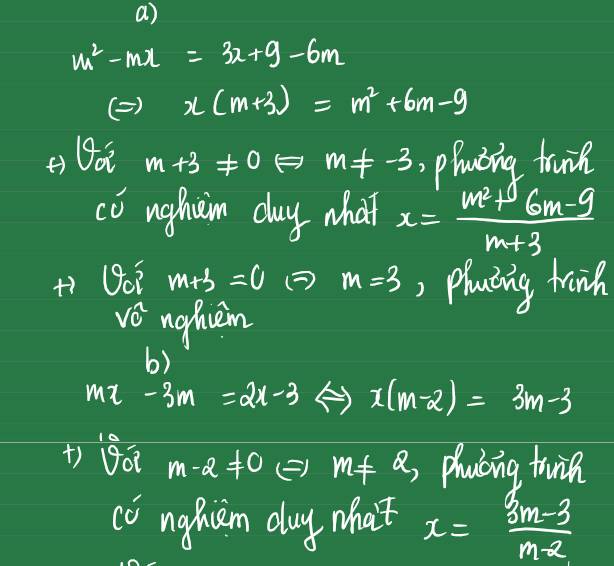giải pt và biện luận :
a) (1-m).x = \(m^2\)- 1
b) (\(m^2\) - 5m +6).x = \(m^2\) - 9
Hãy nhập câu hỏi của bạn vào đây, nếu là tài khoản VIP, bạn sẽ được ưu tiên trả lời.

\(\left(m^2-5m+6\right)x=m^2-9\)
\(\Leftrightarrow\left[m\left(m-2\right)-3\left(m-2\right)\right]x=m^2-3^2\)
\(\Leftrightarrow\left[\left(m-2\right)\left(m-3\right)\right]\times x=\left(m-3\right)\left(m+3\right)\) (1)
* Nếu \(\left(m-2\right)\left(m-3\right)\ne0\Leftrightarrow m\Leftrightarrow2;3\)
Phương trình có 1 nghiệm duy nhất \(x=\frac{\left(m-3\right)\left(m+3\right)}{\left(m-2\right)\left(m-3\right)}\Leftrightarrow\frac{m+3}{m-2}\)
* Nếu m = 2
Phương trình (1) \(\Leftrightarrow0x=-5\)
\(\Rightarrow\) phương trình vô nghiệm
* Nếu m = 3
Phương trình (1) \(\Leftrightarrow0x=0\)
\(\Rightarrow\) phương trình có vô số nghiệm khi m = 3
Vậy khi \(m\ne2;3\) thì phương trình có 1 nghiệm duy nhất \(x=\frac{m+3}{m-2}\)
khi m = 2 thì phương trình vô nghiệm
khi m = 3 thì phương trình có vô số nghiệm
( học tốt nha )


Với \(m=-1\Leftrightarrow4x+1=0\Leftrightarrow x=-\dfrac{1}{4}\)
Với \(m=1\Leftrightarrow1=0\Leftrightarrow x\in\varnothing\)
Với \(m\ne\pm1\)
\(\Delta=4\left(m-1\right)^2-4\left(m^2+1\right)\\ \Delta=4m^2-8m+4-4m^2-4\\ \Delta=-8m\)
PT vô nghiệm \(\Leftrightarrow-8m< 0\Leftrightarrow m>0\)
PT có nghiệm kép \(\Leftrightarrow-8m=0\Leftrightarrow m=0\)
Khi đó \(x=\dfrac{2\left(m-1\right)}{2\left(m^2-1\right)}=\dfrac{1}{m+1}\)
PT có 2 nghiệm phân biệt \(\Leftrightarrow-8m>0\Leftrightarrow m< 0\)
Khi đó \(\left[{}\begin{matrix}x_1=\dfrac{2\left(m-1\right)-\sqrt{-8m}}{2\left(m^2-1\right)}\\x_2=\dfrac{2\left(m-1\right)+\sqrt{-8m}}{2\left(m^2+1\right)}\end{matrix}\right.\)

d)
\(x\ne a,x\ne b\)
đặt \(\frac{x-a}{x-b}=t\Leftrightarrow t+\frac{1}{t}=2\Leftrightarrow\frac{t^2-2t+1}{t}=0\Rightarrow t=1\)
\(\frac{x-a}{x-b}=1\Leftrightarrow\frac{\left(x-a\right)-\left(x-b\right)}{x-b}=\frac{b-a}{x-b}=0\)
Vậy: \(a\ne b\) Pt vô nghiệm
a=b phương trinhg nghiệm với mọi x khác a, b
